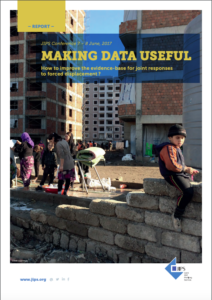The 2017 JIPS Conference, held on 7 and 8 June in Geneva, Switzerland at the Villa Sarasin, brought together over 60 data users and data providers to consider the theme of Making Data Useful: How to improve the evidence-base for joint responses to forced displacement?
At JIPS we are excited to share with you this Conference report as well as the accompanying video. We hope the event itself and these key products help to inspire a wider audience to improve the usefulness of data practices so we can collectively better inform national, humanitarian, and developmental responses to forced displacement globally.
https://youtu.be/TlLuXQUPBM8
It is not often that those who collect and analyse data meet together with those who use that data in their decision-making processes. The Conference provided space for an honest and open dialogue to tackle some of the current and persistent challenges that hamper data use. It brought together participants from government, humanitarian and development organisations as well as specialists from statistical offices, the private sector and the NGO community in order to do this. Through a mix of plenary and breakout sessions, a number of recommendations emerged around improving the use of data, as well as highlighting new issues requiring further consideration and attention moving ahead.
 Specific recommendations were highlighted throughout the different sessions of the Conference. They can be found under each sub-section of the report and included recommendations linked to :
Specific recommendations were highlighted throughout the different sessions of the Conference. They can be found under each sub-section of the report and included recommendations linked to :
More general recommendations emerging from the Conference included :
Get your copy of the Conference report, and hear what participants say about the event!